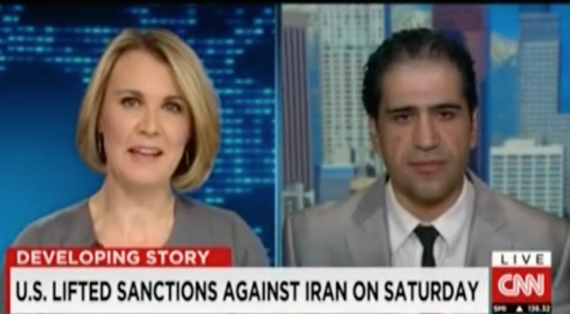The Islamic Republic hit the highest rate of executing people since 1989. The official number indicates that Iran executed nearly two times more people in 2015 in comparison to 2010 when the hardline president Mahmoud Ahmadinejad was in office, as well as roughly 10 times more than the number of executions in 2005.
Approximately 1000 people were executed in 2015, according to the latest report from the United Nations investigator, Ahmed Shaheed, the special rapporteur for human rights in Iran. The unofficial number is higher.
The peak of the executions in 2015 was between April and June in which nearly 4 people were executed every day on average. Most of the executions were carried out in prisons located in urban areas such as Ghezel Hesar and Rajai Shahr in Karaj, and Adel Abad in Shiraz.
Iran has surpassed China in the number of executions being carried out per capita. Most of the executions in Iran are being done by hanging. In addition to the alarming increase in executions, fundamental rights of Iranians and ethnic and religious minorities appear to have regressed in 2015 as well. In addition, this year witnessed the highest level of disqualification of political candidates, 61 percent, since the establishment of the Islamic Republic, 1979.
Who and Which Groups are Being Mainly Targeted
Iranian authorities claim that these executions are overwhelmingly related to drugs offenses. Nevertheless, many of the executions were linked to other issues. Only around 65 percent of those who were executed were charged with violating Iran's narcotics law.
In other areas, according to Amnesty International, the Islamic Republic remains a leading executioner of minors. Currently, 160 juvenile offenders are on Iran's death row. Other human rights groups also believe that Iran has executed more juveniles than any other country. Michael G. Bochenek, senior counsel of the children's rights division at Human Rights Watch pointed out "Iran is almost certainly the world leader in executing juvenile offenders." Some articles in Iran's criminal code allows girls as young as 9 and boys as young as 15 to receive death sentences.
In addition, ethnic and religious minority communities, including the Sunni, Arabs, and Bahai continue to be systematically targeted and discriminated against.
Iran's Sunni are the largest minority in the country. Some of the discrimination that the Sunnis have suffered, according the UN report, are that the Sunni communities in Iran "have long complained that Iranian authorities do not appoint or employ them in high ranking government positions such as cabinet-level ministers or governors. They have also raised concerns regarding reported restrictions on the construction of Sunni mosques in Shia-majority areas, including the capital Tehran, and the execution or imminent execution of Sunni activists the government alleges were involved in terrorist-related activities."
Other groups include journalists, artists, writers, musicians, and human rights activists who witness arbitrary arrests, detentions and prosecutions.
Amnesty International and the United Nations do not have executive power to force Iran to reform its law or hold Iranian leaders accountable, but the UN can offer recommendations such as the latest one in which Iran is asked to "take the necessary steps to ensure and that it citizens fully enjoy the rights and freedoms awarded to by the Iranian constitution with special emphasis on the right to freedom of expression, the right to political activity and their right to assemble". According to Nazanin, an Iranian lawyer based in Karaj, " Iran's judiciary and parliament will ignore these recommendations and not follow up with them".
Rouhani's Pledges
One of Rouhani's main promises was to promote and reform restrictive law in relation to civil liberties and social justice. "The situation has not changed since Rouhani came to power. They only talk about their victory with regards to the nuclear deal, while a lot people and religious minorities face daily discrimination", Morteza, an Iranian teacher in city of Esfahan pointed out.
When it comes to number of people being executed as well as the rights of ethnic and religious minorities, Iran's president would not change the status quo regardless of whether he is being presented as a moderate or hardliner.
The major institutions which have power over these matters are the judiciary system (its head is appointed by the Supreme Leader, Ayatollah Ali Khamenei), the ministry of Intelligence, the office of the Supreme Leader, the Revolutionary Guards, and paramilitary groups such as the Basij.
In order to preserve his own interests and power, an Iranian president will not stand against these powerful political establishments, and will support the ruling political establishment. In fact, the number of executions increase and rights for ethnic and religious minorities appear to deteriorate when the Islamic Republic has "moderate" or "reformist" president. The above institutions tighten the rules in order to send a message to the Iranians that a non-hardline president does not mean that the country is liberalizing its politics.
_______________
Dr. Majid Rafizadeh is an American political scientist, business advisor and the president of the International American Council on the Middle East. Harvard-educated, Rafizadeh serves on the advisory board of Harvard International Review. An American citizen, he is originally from Iran and Syria, lived most of his life in Iran and Syria till recently. He is a board member of several significant and influential international and governmental institutions, and he is native speaker of couple of languages including Arabic and Persian. He also speaks English and Dari, and can converse in French, Hebrew.
You can sign up for Dr. Rafizadeh's newsletter for the latest news and analyses on HERE. You can also order his books on HERE.
You can learn more about Dr. Rafizadeh on HERE.
You can contact him at Dr.rafizadeh@post.harvard.edu or follow him at @Dr_Rafizadeh. This post first appeared on Al Arabiya.

